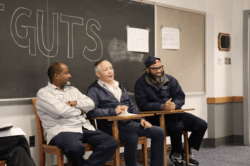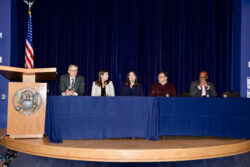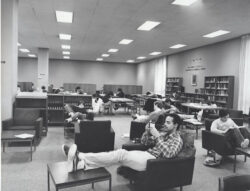An increasing number of Georgetown students have received letters from the Office of Student Conduct indicating that their University IP address has been connected with illegal file-sharing.
This increase has occurred even after the Recording Industry Association of America filed lawsuits against over 4,600 people for illegally sharing music since fall 2003.
Judy Johnson, Director of Student Conduct, has noticed an increasing trend.
“A few years ago, I might only have met with one or two students a month about this,” she said. “Now, I’m seeing around 30 students every month.”
Nevertheless, Johnson said she is optimistic that the school’s handling of the file-sharing complaints is having an effect on students. She has not encountered any repeat offenders.
University Director of Media Relations Laura Cavender said that the University did not keep statistics on the number of letters sent to alleged file-sharing offenders as they are not considered disciplinary sanctions.
When the RIAA locates a University IP address that has allegedly participated in illegal file-sharing, it contacts Georgetown University Information Services, which in turn contacts Johnson. Johnson then sends the offending student a letter requesting that he come to a meeting to discuss the alleged violation.
“There are no disciplinary actions taken, we simply explain the effects and risks to the student of illegal uploading and downloading,” Johnson said.
Not all students are dissuaded from file-sharing by the University’s warnings. Priya Sethi (SFS ‘07) was one of dozens of students to receive a letter from the Office of Student Conduct.
“I stopped uploading files, and the letter had a significance. But I do continue to download music,” she said. “I don’t know if any of the other people have stopped file-sharing.”
The number of people sharing files online continues to increase. According to a study by BigChampagne marketing research firm, 8.2 million people on average were using illegal downloading sites in July, up from 5.2 million a year earlier. The music industry has maintained close attention to music downloading on university campuses.
“Even though high-speed campus networks were rife with illegal file sharing, college administrators were often indifferent to the problem,” a memo from the RIAA in reference to the pre-lawsuit era of file-sharing stated. “No universities provided students with legal alternatives.”
Numerous groups have sprung up on the Internet to contest the RIAA’s tactics, suggesting renaming files or prohibiting uploading by other users to avoid the RIAA’s attention. They often invoke freedom of speech as justification for downloading.
The music industry’s aggressive campaign utilizes the same rhetoric, invoking the first amendment and free speech, including the Copyright Act of 1976.
Last year, legal action was taken by the RIAA against Georgetown students. UIS received three subpoenas demanding the names of students who were accused of downloading music on three specific IP Addresses.
According to Clay Shields, Associate Professor of Computer Science, third-generation file-sharing software offers students a legal alternative to popular file-sharing programs like Kazaa and Limewire.
With the birth of programs such as Apple’s iTunes, students can legally listen to other users’ music and watch their movies, with one catch: They can’t download them onto their own computer.




